On December 10, Kissinger began to encourage the Chinese to take action against India: 'If the People's Republic were to consider the situation on the Indian subcontinent a threat to security, and if it took measures to protect its security, the US would oppose efforts of others to interfere with the People's Republic.'
On the 50th anniversary of India's greatest military victory, Claude Arpi recalls how the US suggested that China intervene militarily on Pakistan's side.
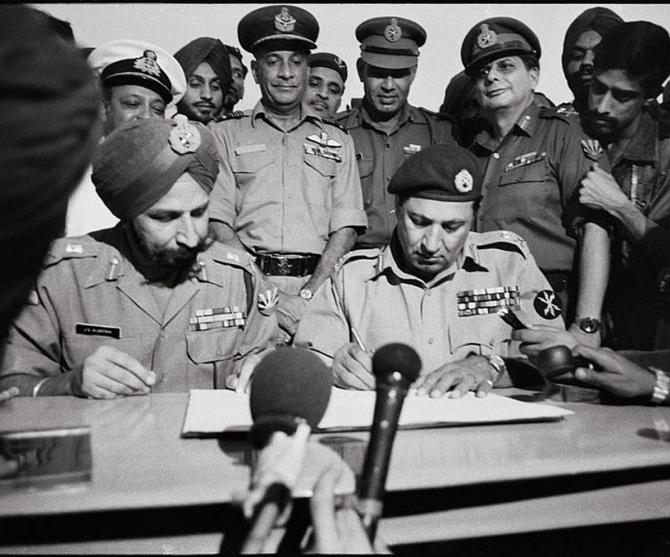
Rarely has the birth of a new country became an event observed by the entire planet; it has happened for Bangladesh.
Soon after the Pakistan army crackdown on sleeping unarmed Bengali students at Dacca University on March 25, 1971, an event which triggered the Bangladesh Liberation War eight months later, Joan Baez wrote The Song of Bangladesh.
It would be released in an album a year later, by then millions already knew the lyrics (and what had inspired the singer).
The Concert for Bangladesh, organised by ex-Beatle George Harrison along with Pandit Ravi Shankar at Madison Square Garden in New York City on August 1, 1971, marked the minds of a generation.
The Bangladesh Liberation War is fascinating because it encompassed so many diverse features simultaneously.
Not only artists, but a number of intellectuals (such as Andre Malraux, then the French culture minister) supported the millions of Bengalis fleeing their homeland after Pakistan's generals unleashed terror on the populace.
The Meaning for India
For the Indian Army, the war was proof that with good political leadership, down-to-earth defence officers, the misadventure of 1962 could be left behind.
The Liberation of Bangladesh also saw the end of the sacrosanct Panchsheel policy; by intervening inside Pakistan's territory, India showed that the Right to Self-Determination can prevail over other principles.
This possibly explained the nervousness of Communist China which had just been admitted to the UN: Would India one day 'liberate' Tibet, like it was in the process of doing for Bangladesh?
But while it will remain in world history as an episode which united the multitude of progressive forces in all continents in an aspiration for a better world, many nations played an extremely negative role, first and foremost of these being the United States of America and China.

The Role of the US
The negative role of the United States, particulary of President Richard M Nixon and his national security adviser Henry Kissinger is today well known; a large corpus of files/documents have been declassified, particularly by the national security archive in the United Sates.
William Burr, senior analyst at the NSA commented: '[This] deserves the attention of the widest possible readership because of its fascinating, sometimes startling, revelations on Nixon administration policy. It gives the reader an unparalleled perspective on the inner workings of White House policy throughout the crisis.'
Already in 2002, the NSA and the George Washington University's Cold War Group had published a series of declassified US documents on the Sino-American rapprochement.
The NSA Web site observed: 'This material documents Nixon's efforts to make contacts with Beijing during 1970-1971 as the basis for rapprochement after decades of hostility. ...Since the beginning of his presidency in early 1969, and even earlier, Nixon had been interested in changing relations with China, not least to contain a potential nuclear threat but also, by taking advantage of the adversarial Sino-Soviet relationship, to open up another front in the Cold War with the Soviet Union.'
India had no place in the new scheme, as Delhi would soon realise.
In October 1970, Kissinger met with Pakistan's dictator General Yahya Khan, who had offered a channel for Sino-American communication a year earlier: 'The Pakistani channel produced an important message from Zhou (then Chinese premier Zhou En Lai) in December 1970, which quickly generated a White House response.'
In April 1971, even while the Bangladesh crisis had already become acute, China and the US engaged in 'ping pong diplomacy'; at the same time, Nixon made public statements about his interest in visiting China.
On April 27, 1971, the Pakistani ambassador delivered Zhou En Lai's reply: 'Mao Zedong's and Zhou's interest in receiving a visit from Nixon laid the way for Kissinger's secret trip in July 1971 and the beginning of the US-China effort to discuss the issues that had divided them over the years.'
This corresponds to the period when millions of refugees had started pouring into India; it shows that Washington was not in the least bothered by the humanitarian crisis; it was too busy trying to fix a rapproachment with China; India and the refugee crisis in then East Pakistan were nowhere in the American preoccupations.

More NSA Documents
The NSA released new archival material in 2005; it was entitled: 'New Documents Show White House Ignored Regional Nature of Crisis and Risked Confrontation with Moscow to Look Tough'.
A now-famous document says, 'Nixon's dislike of 'witch' Indira'.
Both Nixon and Kissinger saw India as a 'Soviet stooge'; they 'downplayed reports of Pakistani genocide in what is now Bangladesh, and even suggested that China intervene militarily on Pakistan's side.'
In fact, they completely ignored the reports of their staff posted in the US consulate general in Dacca; Washington knew very well about the 'reign of terror' orchestrated by Pakistani forces, but chose to ignore the facts for the sake of the rapprochement with China.
It is worth noting that Archer Blood, the then US consul general in Dacca, was never promoted for daring to tell the truth to his bosses in the state department.
The NSA Web site affirmed that Nixon and Kissinger did not want 'to get [the] West Pakistanis turned against us, in part because President Yahya was providing a secret communication link for their quest for rapprochement with China.'
The close China-Pakistan relationship 'was central to Nixon's wish to 'tilt' US policy toward Pakistan in part to show Beijing that Washington would support its allies,' commented the think-tank.
While the refugee issue was becoming the main bone of contention between India and Pakistan, Nixon and Kissinger thought that China, which had a close relationship with Pakistan, could play a role in the crisis.
Nixon and Kissinger believed that a Cold War confrontation could involve a China-Soviet conflict and US confrontation with the Soviet Union: 'Nixon and Kissinger overlooked the regional, ethnic, and national dimensions of the crisis and instead saw it in terms of the Cold War and macho terms, which made the crisis even more dangerous; they risked a China-Soviet conflict so they could demonstrate what they thought was toughness and resolve,' commented Burr.
There are interesting accounts of Nixon's meetings with Kissinger on November 5, 1971, after the Indian prime ,inister's visit to Washington; Kissinger said the 'Indians are bastards anyway. They are starting a war there [in Bangladesh] ... While [Indira Gandhi] was a bitch, ... she will not be able to go home and say that the United States didn't give her a warm reception.'
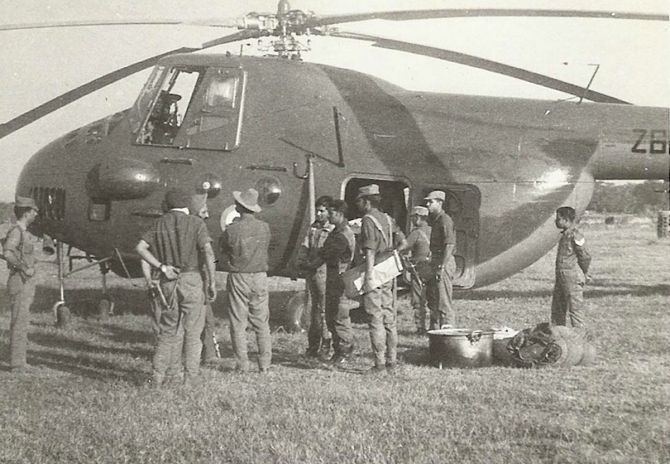
Will China help?
But the duo wanted China to put more pressure on India: 'I think we've got to tell [the Chinese] that some movement on their part ... toward the Indian border could be very significant.'
Was it a CIA report which led Kissinger and Nixon to believe that India intended to dismember Pakistan and destroy its armed forces? This has not come to light.
In any case, at that point in time that Nixon and Kissinger decided to send a US aircraft carrier and other naval forces into the Bay of Bengal 'in order to prevent a 'Soviet stooge, supported by Soviet arms' from overrunning Pakistan.'
Kissinger said that it was done to 'prevent the West Pakistani army from being destroyed. And secondly to retain our Chinese arm. And thirdly, to prevent a complete collapse of the world's psychological balance of power, which will be produced if a combination of the Soviet Union and the Soviet armed client state can tackle [Pakistan] without anybody doing anything.'
The series of cables, reports, minutes continue, with the US completely ignoring the human tragedy highlighted by so many all over the world.
On December 10, Kissinger began to encourage the Chinese to take action against India: 'If the People's Republic were to consider the situation on the Indian subcontinent a threat to security, and if it took measures to protect its security, the US would oppose efforts of others to interfere with the People's Republic.'
On December 12, Huang Hua, China's ambassador to the UN, asked for an urgent meeting in New York with Kissinger who was certain that Beijing was 'going to move. No question, they're going to move.'
Nixon asked his advisor 'what do we do if the Soviets move against them? Start lobbing nuclear weapons.' Kissinger told the President: 'We don't have to lob nuclear weapons. We have to go on alert... We may have to put forces in. We may have to give them bombing assistance.'
Later in the day, Alexander Haig, the deputy national security advisor, met with the Chinese; he informed Nixon and Kissinger: 'the Chinese had not made any military decisions but would call for a cease-fire and mutual troop withdrawal and support a stand-still cease-fire if necessary.'
They had done this on December 6 already; in any case, China was not in a position to intervene militarily after its defence minister Lin Biao died in a mysterious aircrash in Mongolia in September 1971.
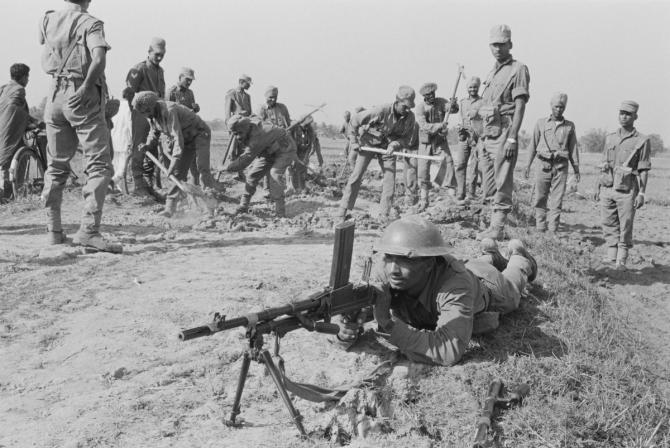
The Bangladesh crisis is perhaps one of the best documented episodes of the Cold War, unfortunately it is only available from the US side; it would be interesting to read the Indian archives (if they exist!) and the Chinese side of the story.
It will probably not happen anytime soon.
On December 16, Pakistani forces surrendered in Dacca; the drama was over. India had fought her battle alone.
Many lessons can be learnt from this multi-faceted war.
Feature Presentation: Aslam Hunani/Rediff.com


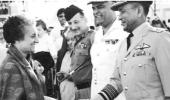

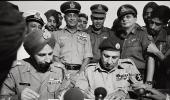



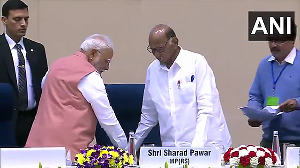

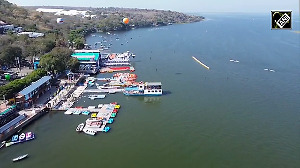
 © 2025
© 2025